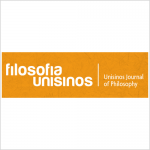Revisiting Poincaré’s conventionalism and anti-realism
Vol 8, No 2 (2007) • Filosofia Unisinos - Unisinos Journal of Philosophy
Autor: Susana Lucero
Resumo:
Poincaré’s philosophical conception and his contribution to the Philosophy of Science has been reconsidered since the recent rise of structural realism (SR), 18 years ago. SR entered the stage with John Worrall’s paper “Structural Realism: The Best of Both Worlds?” (1989). The article intended to set the possibility of attaining a reliable knowledge about the unobservable entities of a world independent of the mind. What scientific theories reveal to us are not the intrinsic properties of unobservable objects but their relations, which are reflected in the mathematical equations of our best scientific theories. J. Worral also refers to Henri Poincaré as the most enlightened precursor of SR. The fact that Poincaré is referred to as a precursor of a realist conception conflicts with a very different image that derives from Popper’s writings. The main purpose of this paper is to refute that view and provide an image more in accordance with Poincaré’s actual thought. It elaborates on the meaning of his conventionalism and highlights the empiricist aspects of his view of science. The alleged antirealism attributed to Poincaré is carefully analyzed. It is also shown that Poincaré should be situated – as Worrall suggested – within the philosophical framework of scientific realism.
ISSN: ISSN: 1984-8234
Texto Completo: http://revistas.unisinos.br/index.php/filosofia/article/view/5814
Palavras-Chave: conventionalism,instrumentalism,scientific re

Filosofia Unisinos - Unisinos Journal of Philosophy
The journal Filosofia Unisinos - Unisinos Journal of Philosophy is published once every four months by Universidade do Vale do Rio dos Sinos.
Articles must be original, unpublished, and not under consideration for publication anywhere else and can be written in Portuguese, English or Spanish
Filosofia Unisinos - Unisinos Journal of Philosophy prints articles, translations and critical book reviews. It also reprints papers that are considered fundamental to the area when authorized written permission is given by the original publisher.
